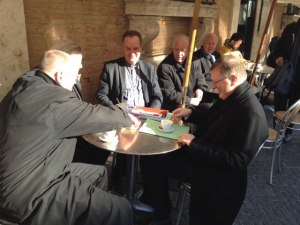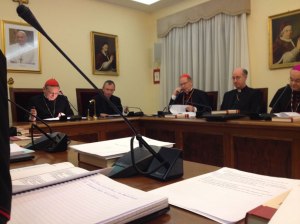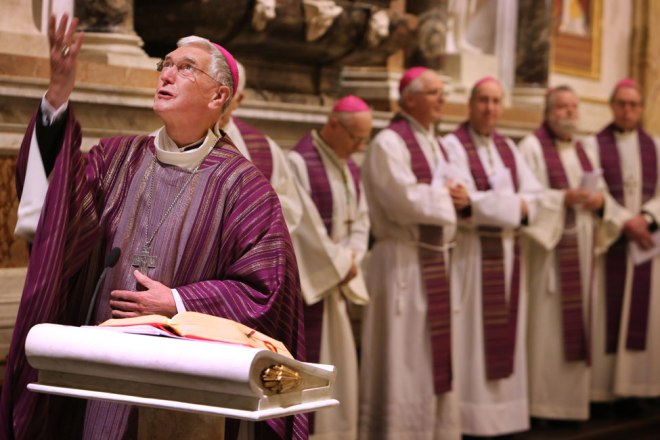With the ad limina officially over (although one meeting has been moved to today for those bishops remaining in Rome), it’s time to take a look back at what took place on Thursday. Friday activities will follow in due course.
Thursday morning was filled with the usual meetings, this time to the Pontifical Council for Legislative Texts and the Congregation for Institutes of Consecrated Life and Societies of Apostolic Life (the Congregation for Religious, in sort). Bishop Hendriks, in his daily blog, reports that these were “not boring, despite what some might think”. The meeting with Cardinal Coccopalmerio at the Pontifical Council, the bishop writes, was very fruitful and revealed that many cases of church closings and the merger of parishes, all very current affairs in the Dutch Church, need further study.
Not all bishops attended these meetings, as some were at the Pontifical Council for Culture. Bishop Gerard de Korte, one of these, expressed specific admiration for Cardinal Gianfranco Ravasi, the Council’s president, and his project of the Courtyard of the Gentiles, which aims to foster dialogue between faithful and non-faithful.
 In the afternoon, after a lunch and cappuccino break (at left), Cardinal Angelo Amato received the bishops at the Congregation for the Causes of the Saints (pictured below), a meeting with some consequences for current Dutch causes. Top of the list were the martyrs of Alkmaar, murdered for the faith in 1572, and Fr. Johannes Roothaan, the second founder of the Jesuit Order. Both causes were dormant for decades, but may now become active again.
In the afternoon, after a lunch and cappuccino break (at left), Cardinal Angelo Amato received the bishops at the Congregation for the Causes of the Saints (pictured below), a meeting with some consequences for current Dutch causes. Top of the list were the martyrs of Alkmaar, murdered for the faith in 1572, and Fr. Johannes Roothaan, the second founder of the Jesuit Order. Both causes were dormant for decades, but may now become active again.
 Bishop Frans Wiertz presented Dutch-born Bishop Frans Schraven as a possible patron saint for victims of sexual abuse. The case of Bishop Schraven, killed in China by Japanese soldiers in 1931 for not submitting the women and girls under his protection to be used as sex slaves, was opened earlier this year.
Bishop Frans Wiertz presented Dutch-born Bishop Frans Schraven as a possible patron saint for victims of sexual abuse. The case of Bishop Schraven, killed in China by Japanese soldiers in 1931 for not submitting the women and girls under his protection to be used as sex slaves, was opened earlier this year.
Mass on Thursday was offered at the church of the German College in Rome, the Santa Maria dell’Anima, which is also home to the grave of the only Dutch pope, Pope Adrian VI. Bishop Antoon Hurkmans was the homilist, and he spoke, among other things, about the mystery of the Church:
“The Church is a mystery because, although she is human, she is especially divine. We are the people of God. It is easy to recognise the human and the too human in the Church. The divine is harder to see, and can’t be caught in questionnaires. This depends on faith. In Jesus the human and the divine go together harmoniously. God is visible in the power of His words, in the signs He gives. The Apostle Thomas confesses, when He sees the signs of His wounds upon seeing Christ: “My Lord and My God”.
On another level, the Church carries God. God calls His people together. He is present in the faithful, in Holy Scripture, in the Sacraments, among others in men whom God calls to make Christ present in the Church as priests.”
Bishop Hurkmans also spoke about those who were the first to be called, the Apostles.
“Consider Peter. He is among us in his successor, Pope Francis. In a unique way he calls us to faith and gives hope to many. He speaks about Gods mercy. He touches, embraces, the hurt. His aim is to return to the Church the glory of her divine soul. He emphasises the mission of he Church: to restore hurt people in Christ. He explains, as we heard in the first reading, that there is no place in Gods plan for high fortresses. For pride, arrogance, selfish wealth. In the end times the gates of heaven will be opened for the just nation who remained loyal to God. Every Pope presents heavenly Jerusalem to the world. May our faith remain standing amid the storms and danger which leave destructive traces in Church and world. To continue expecting everything from God, in humility and simplicity.

He then likened the current Pope to his predecessor, Pope Adrian VI, who saw his own attempts to reform the Church stopped by an early death. “Adrian, a simple, humble Apostle who gave Christ a central place in the concrete life of the Church”.
“Brothers, brothers and sisters, in our time marked by a cultural break, Popes are part of a Church and world marked by secularisation, by a gap between rich and poor, by the need to clear the past, by major ethical questions because of the strides of science and digital means. There is so much around us. Today, Jesus calls us, as we heard in the Gospel, to continue searching for the basis. Christ continues inviting us to place ourselves under God, to do His will. Christ leads. He is the way, the truth and the life. It is Advent. Christ is coming among us. Let us, following the example of Peter, Adrian and our Pope Francis, make the mystery of the Church visible. By a simple and poor life. By meeting our neighbours one by one and come together with them around Christ. He comes to us, let us go to Him in gratitude. From our meeting with Him the reform that our time needs will flower. May God reign in our hearts. Amen.”
Finally, the bishops did not let the eve of the feast of St. Nicholas go by unnoticed, as Bishop Hurkmans surprised them all with a little present from the saint. “They can say a lot about bishops, but they all worked very hard,” he said as the reason for the presents. “Sinterklaas has asked me to respond to that and be his Zwarte Piet,”the bishop joked. “I have made a reminder to Pope Francis and Rome, and I have a print on which I wrote: “Ad Limina 2013. It is Francis! Faith, hope and love” with ‘hope’ underlined twice.”
Fr. Roderick Vonhögen made the video below for RKK. It is delightful to see our bishops in lighthearted moments like these.
Photo credit: [1] [2] Bishop Jan Hendriks, [3] Ramon Mangold